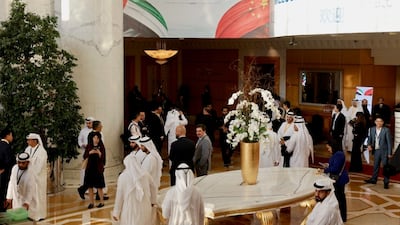Emirates airline aims to add new destinations in China over the next year, as the UAE and the world's second-largest economy aim to deepen trade and investment ties in sectors from renewables to health care.
The countries are focusing on key sectors including green energy, digital economy, artificial intelligence, biotechnology, health care and advanced manufacturing, in addition to the more traditional industries of energy and infrastructure, company executives and government officials said at the UAE-China Business Forum on Thursday.
To help with the movement of people and goods, the Dubai-based airline plans to increase flight frequencies and open new routes in China, Nabil Sultan, executive vice president of passenger sales and country management at Emirates, said during a panel discussion at the forum.
The number and timing of the new routes to China will depend on bilateral negotiations between the two countries, Mr Sultan told The National on the sidelines of the event. Emirates is currently operating to the full extent of its air traffic rights, he said.

"We'll be able to get something in the pipeline over the next year ... we reckon hopefully in the first quarter of next year, where we might see some addition both in terms of frequency and new destinations," Mr Sultan said.
Emirates currently flies to three destinations in China from Dubai. It operates 14 flights each to Shanghai and Beijing every week, and a daily flight to the port city of Guangzhou.
"The Chinese market is massive and it's really opening up in a big way," Mr Sultan said, referencing the Chinese government's move to provide visas for more nationalities, including visitors from Europe, that will further stimulate inbound tourism.
Beijing has also doubled the number of countries for which Chinese travellers can obtain visas to 130 this year, compared with only 60 last year.
"There is a huge change in the demographic and dynamics of how the Chinese market is operating," Mr Sultan said. "We've seen more and more younger generations who have the purchasing power to go on holidays, they are tech-savvy, they speak English and they're international travellers. So we're going to see a lot of these younger generations embarking on these journeys."
Emirates last year carried more than a million passengers between Dubai and China, including holidaymakers, business travellers and students, the executive said.
"The Chinese market is probably at the brink of real expansion and we believe adding capacity there is the right way forward. As bilateral agreements come to flourish, we will come to more and more capacity going into China," Mr Sultan said.
Emirates operates about 35 flights into China each week, using its Boeing 777 wide-bodies, and is assessing the potential for an upgrade to the bigger Airbus A380 double-decker. "All of that is under the microscope now," he said.
In terms of the movement of goods from China, Emirates sees big opportunities for air freight, with Dubai as a re-export hub for products heading onwards to other destinations in the region and beyond.
"We're positioned perfectly geographically to act like an extending arm for Chinese logistics investors. The biggest challenge is that all the capacity out of China is completely chock-a-block. There are huge constraints on capacity due to the current geopolitical scene and the Red Sea challenges in maritime industry," he said.
Those challenges in the Red Sea mean air freight is a faster solution to transport goods, he added.
Boost to UAE-China ties
During a speech at the forum late on Thursday, Abdulla bin Touq, UAE Minister of Economy, urged Chinese companies to “benefit from the abundance of economic opportunities that the UAE’s business environment enjoys”.
He called on Chinese companies to expand their presence across various sectors, including tourism, aviation, the circular economy, FinTech, e-commerce, infrastructure, artificial intelligence, health care, smart transportation and sustainable manufacturing.
The total number of Chinese businesses operating in UAE markets has reached about 15,500, he said.
Meanwhile, the number of Chinese tourists visiting the UAE reached 1.2 million in 2023, an increase of 213 per cent from 2022, he added. There are currently 44 flights operated by the UAE’s national carriers connecting the two countries every week.
This comes as the number of Chinese companies entering the Dubai market is on the rise. In the first eight months of this year, 1,004 new Chinese companies registered with the Dubai Chamber of Commerce, an increase of 20 per cent year-on-year. That takes the total number of active Chinese members to 5,480 during the period, Abdul Aziz Al Ghurair, chairman of Dubai Chambers, told The National on the sidelines of the forum.
The number of new Chinese companies registered with the Dubai Chamber of Commerce is expected to grow 30 per cent year-on-year to reach about 6,000 by the end of 2024, Mr Al Ghurair said.
Dubai International Chambers, which attracts foreign investment into the UAE and assists domestic companies in overseas expansion, has offices in Shanghai, Shenzhen and Hong Kong, the most it has in another country.
The forum was attended by Sheikh Ahmed bin Mohammed, Second Deputy Ruler of Dubai, while the visiting delegation was led by Chinese Premier Li Qiang.


